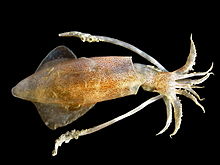European squid
| European squid | |
|---|---|
 |
|
| Live specimen of L. vulgaris from the Belgian continental shelf, photographed on board the RV Belgica. (ML: 138 mm, MW: 39 mm) | |
| Scientific classification | |
| Kingdom: | Animalia |
| Phylum: | Mollusca |
| Class: | Cephalopoda |
| Order: | Teuthida |
| Family: | Loliginidae |
| Genus: | Loligo |
| Species: | L. vulgaris |
| Binomial name | |
|
Loligo vulgaris Lamarck, 1798 |
|
The European squid or common squid (Loligo vulgaris) is a large squid belonging to the family Loliginidae. It occurs abundantly in coastal waters from the North Sea to at least the west coast of Africa. This species lives from sea level to depths of 500 m (1,600 ft). Its mantle is up to 40 cm (16 in) long. The species is extensively exploited by commercial fisheries.
Loligo reynaudii, the Cape Hope squid, was previously treated as a subspecies of L. vulgaris.
The European squid has a long, moderately slender and cylindrical body. Rhomboid fins comprise two-thirds of the mantle length, though locomotion is via jet propulsion. The posterior border is slightly concave. The head is relatively small and has large eyes which are covered with a transparent membrane. Like almost all squid, this species has ten limbs surrounding the mouth and beak: eight are relatively short arms, and two, which form the tentacles, are long, as they are used to catch prey. The fourth left arm of males is a . The European squid can grow up to 30–40 cm in the mantle length, but more usually they are 15–25 cm long. The males are generally bigger than the females and exhibit more rapid rates of growth.
The colour of the European squid is greyish-transparent or reddish, depending on the expansion of chromatophores in the dermis. Males have small chromatophores on their mantle.
The European squid is a neritic, semidemersal species, which undertakes distinct horizontal and vertical migrations, depending on the environment. In the Adriatic Sea, European squid can be found above various substrates, from sandy through to the muddy bottoms.
...
Wikipedia
